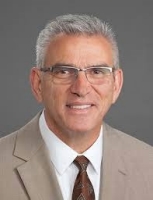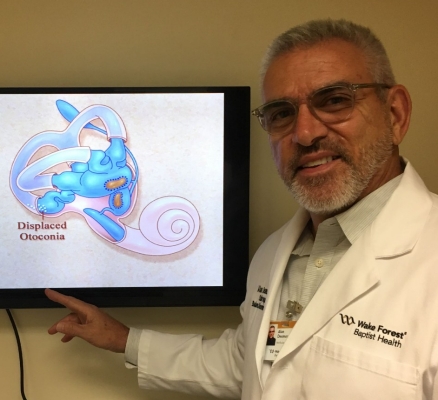Alan Desmond ’79, M.S. ’81

Alan Desmond ’79, M.S. ’81, knew he wanted to pursue a career in audiology after taking just one class at Radford University.
Desmond transferred to Radford as a junior from a local community college in his hometown of Boston, Massachusetts. Before transferring, Desmond took an interest inventory assessment, and one of the results was speech pathology. Without knowing much about the field, he enrolled at Radford as a communication sciences and disorders major. It was in his very first class that he was introduced to audiology.
“I really never looked back from there,” said Desmond. “I was just captivated by the anatomy and physiology of the ear. It sounds corny, but it was very interesting to me, and it has never not been interesting to me since.”
Desmond not only earned his bachelor’s degree in communication sciences and disorders from Radford, but also his master’s degree in audiology. He then entered the world of private practice where he worked for 30 years.
A decade into his career, Desmond encountered a patient with an unusual inner ear disorder. Unable to diagnose her, he sent her to a University-based medical center. When the doctors there solved her problem in just one day, Desmond knew he wanted to learn more about the “magic” that was diagnosing and treating inner ear vestibular disorders. It was that experience that charted him on a course forward to study to earn the education and credentials necessary to practice and teach as a vestibular specialist.
Several years later, Desmond returned to school to earn his clinical doctorate degree in audiology from Central Michigan University. During this time, he completed his capstone, which entailed writing a book about evaluating patients with inner ear disorders. After this doctoral committee told him it would make a good textbook, he went on to publish first and second editions. It was this experience that helped him build the qualifications necessary to move into the world of academia.
“I did things professionally that were not typical of a small private practice,” explained Desmond. “They were typically only found in major University medical centers. A lot of people told me, ‘You’re crazy,’ but I took it one step at a time and built a very successful vestibular lab. That’s what Wake Forest was interested in: for me to reproduce it in an academic setting.”
Four years ago, Desmond did just that. He started a vestibular clinic at Wake Forest University. He says the key to his success was having self-confidence and the ability to resist criticism.
“If you’re going to take a career path that steps outside the lines, there will be critics trying to push you back in. You have to have confidence,” said Desmond. “Don’t let people dictate to you how things should be or what you should do. Despite being told, ‘Don’t do that,’ I did what I thought was the right thing to do, and I did it with preparation and forethought.”
Another key to Desmond’s success was his willingness to participate in unpaid internships throughout his career. He spent time at Stanford Medical Center where he about vestibular inner ear disorders and a month at House Clinic in Los Angeles learning from people who were doing groundbreaking research on inner ear diagnosis.

“Sometimes you have to make the effort and put in the time and cost to seek teaching from the best people – to be around the innovators and to be around the people who are going in the direction you want to go,” explained Desmond.
One thing that stuck out to Desmond, while he was a student at Radford, was the people he was able to surround himself with, including both students and faculty.
“Something that was new to me at Radford was that I was exposed to people who would say, ‘After dinner, I’m going to go back and study.’ I had never been around people who would rather study than go out at night. It’s important to be around people like that,” said Desmond.
Desmond says the most memorable part of Radford experience, though, was how engaged the professors were with students.
“The professors were extremely welcoming and took a lot of time with me. That first class I took, anatomy and physiology, was hard work with hours put in. The professor of that class was very good. He spent a lot of one-on-one time with me, and that was very helpful,” said Desmond.
Desmond also recalls his experience as a graduate student. He was a part of the first-ever class of audiology students at Radford. Because it was a new and evolving program, there were many opportunities for critical analysis, research and self-learning. It was his self-learning experience that initially propelled him to seek out private practice opportunities.
“It was a very successful and rewarding career,” said Desmond, “and there was never really a doubt that it was the career I wanted.”
Sept. 30, 2019
Bailey Black
540-831-5491
biblack@radford.edu